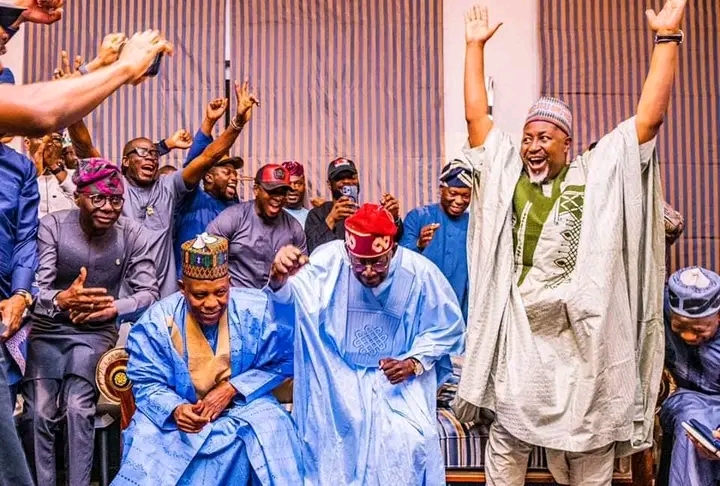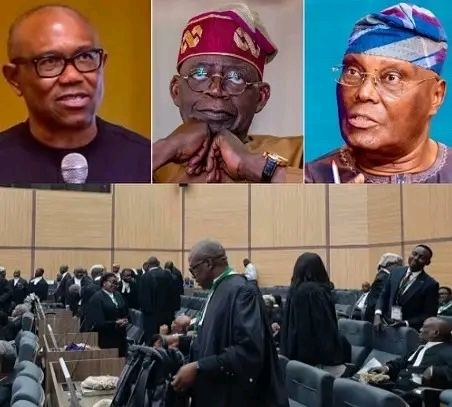Full Details of Supreme Court’s Judgment of 2023 Nigeria Presidential Election Petition
All the abracadabra on the circumstances surrounding the event of the 2023 presidential election in Nigeria were on Thursday, the 26th of October 2023 laid to rest. This is a sequel to the judgment delivered by a five-man panel of judges of the Supreme Court of Nigeria sitting in Abuja.
Before the ruling, there were a series of concerns about the unprecedented judgment, and about the various moves made by one of the petitioners, Alhaji Atiku Abubakar seeking the nullification of the result of the February 25th, 2023 poll.
Atiku had gone to obtain the Varsity certificate of Senator Bola Tinubu at Chicago State University, over an alleged forgery, a step that had in recent months triggered a series of reactions.
Meanwhile, in a ruling presided over by Justice Inyang Okoro (SAN), in a unanimous decision unequivocally delivered on the various petitions challenging the result rendered them null, void, and of no effect.
Live Transmission…
9:54 a.m: Justice Okoro recalls Chris Uche (SAN), Atiku’s lawyer’s argument regarding the difficulty in obtaining Mr Tinubu’s academic records from the Chicago State University.
INEC lead Council, Abubakar Mahmoud argued that an allegation is criminal and requires to be proved beyond a reasonable doubt. This an appeal being based on an election matter, the implication is that all evidence ought to have been adduced judgmental court ajudgmentent delivered within 180 days, Justice Okoa.m.recalled.
10: 01: a.m.: Justice Okoro said, Mr Olanipekun argued that the Supreme Court lacked the power to consider Atiku’s fresh evidence against Mr Tinubu.
The failure to invite the APC and INEC to participate in the court proceedings in the US aimed at obtaining Mr. Tinubu’s academic records from CSU renders the fresh evidence inadmissible, Mr. Olanipekun argued in the court’s decision being read by Mr. Okoro.
Justice Okoro recalled Mr Oladefense’s arg. umount in defense of Mr. Tinubu.
10.05 a.m.: Justice Okoro begins reviewing arguments on the issue of fresh evidence tendered by Atiku.
He verifies to decide the issue from the point of whether or not the court has jurisdiction to accept the new evidence.
The jurisdiction of the court is at the foundation of adjudication, the Justice said.
Jurisdiction clothes the court the power to deter. 10.08 a.m., he says.
10.08 a.m.: Justice Okoro says jurisdiction is the fulcrum upon which every court decision is based.
“I must emphasize that it is trite that election proceedings are their unique class. This court has to take into account the peculiarity of this case.
I have carefully perused the record of Appeal.” he says.
He also said Atiku filed the appeal on the last day of the appealed to appeal.
Meanwhile, the 180 days prescribed by the law lapsed on 17 September, Justice Okoro noted.
10.11 a.m.: Justice Okoro recalled an earlier decision of the Supreme Court which said, “In the circumstance of this case, this court cannot activate section 22 of the Supreme Court Act to admit fresh evidence.”
The application runs foul of 14 of the Evidence Act.
10.15 a.m.: “I still wonder whether Atiku intends to use the document in this proceeding,” says Mr Okoro.
The petitioner shall not be allowed to amend their petition after the 21 days allowed by law, the Justice says.
Furthermore, citing Section 182 of the Electoral Act, Justice Okoro said, “Atiku failed to apply to the court to amend his petition to bring the fresh evidence” against Mr Tinubu.
10.18 a.m.: It is shocking to have Atiku’s lawyer argue in print that there is no statutory time limit of 180 days for the lower court to decide a presidential election petition.
10.19 a.m.: It will be unfortunate to go back to the dark old days when election petitions could be heard up to the point of expiration of the tenure of the person whose election was being challenged, Justice Okoro says of Atiku’s attempt to introduce fresh evidence to extend the case is to adjudicate the case
Consequently, since the Presidential Election Court has no jurisdiction to entertain fresh evidence, the Supreme Court has no jurisdiction to accept fresh evidence. Justice Okoro says.
Recall: 10.20 a.m.: “It has to be noted that the 180 days imposed is immutable and cannot be extended,” Justice Okoro said.
10.23 a.m.: The jurisdiction of this court is donated by the Constitution.
“One wonders what Atiku intends to do when none of the grounds of appeal is hinged on forgery of .certificate against Mr. Tinubu.”
“Finally, on this application, fresh evidence is not received as a matter of cause.”
10.26 a.m.: Atiku failed to convince the Supreme Court why he waited until the elapsed date of the appellant’s suit to tender the document.
The court, therefore, dismisses the Atiku’s application to tender fresh evidence.
10.30 a.m.: The court is now set to deal with the merit of the substantive appeal.
The Supreme Court said that non-transmission of results to IReV and not getting 25% in the FCT isn’t Enough to sack President Bola Tinubu.
In a general decision, the apex court, presided over by Justice Iyang Okoro agreed with the lower court that Rev is a collation center and that there is an elaborate arrangement to ensure that copies of results are available.
“The availability of the RV cannot be a ground for the nullification of the election,”
“The failure to transmit results to irev did not affect the results of the election,” said the apex court
Electoral Act supports: an election cannot be invalidated by provisions of this Act if it appears that the election was conducted substantially in line with the Act
The Presidential Election Petition Commission affirms that results not transferred electronically are not a basis to challenge an election.
It would be recalled that in the September 6 judgment, the PEPC held that INEC has the right to issue guidelines and manuals in line with the provisions of the Electoral Act.
It also said INEC was at liberty to determine the procedure of how its election will be conducted.
ARGUMENT ON FCT 25% SCORE
On the argument that scoring 25% in the Federal Capital Territory is mandatory, Justice Okoro held that the FCT has no special status.
“The decision of the lower court is unassailable and I see no difficulty in agreeing with it”.
He said the constitution is for everyone not for selected one.
Recall that Atiku and Obi had asked for nullification of the election over non-compliance with the rules that INEC set out in lines, which included the E-transmission of results.
However, Justice Tsammani said manuals and guidelines cannot supersede the express provisions of the Electoral Act and it is only a contravention of the Act that can be the basis of an election petition.
Justice Tsammani held that what the law provides for is a physical collation of results and that transmission of results using the law allows the public the opportunity to view the polling unit results on Election Day
Tsammani, who is also the Presiding Justice of the PEPC held that the petitioners had failed to prove acts of omission of the provisions of the Electoral Act which is the only pathway to support noncompliance of noncompliance with the electoral act.
Breaking news
“This court upholds the victory of President Asiwaju Bola Ahmed Tinubu as the winner of the 2023 Presidential election”~
~ SUPREME COURT

